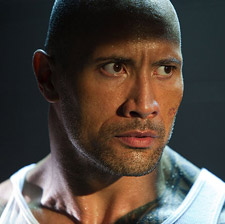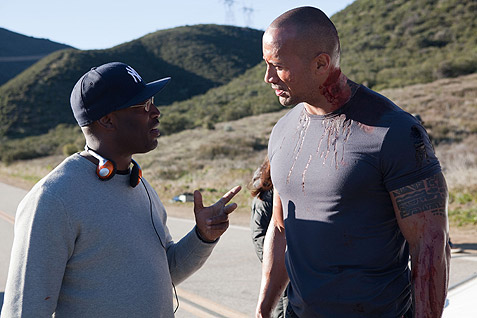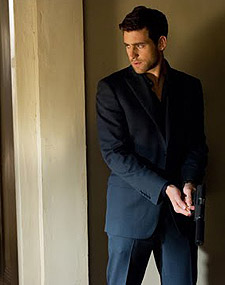
Interview Date: 11/15/2010
Run Date: 11/23/2010
Interviews Home / Movies Home / Bullz-Eye Home
A hard-edged, old-school action-fest with real stunts and car chases might seem like a tall order for a three-time director whose prior films were the family-centric comedy-drama, "Soul Food," and a pair of movie biographies: "Men of Honor," with Robert De Niro and Cuba Gooding as barrier-breaking African-American Navy diver and amputee Carl Brashear, and "Notorious" about the late rapper, Notorious B.I.G. The soft-spoken George Tillman, Jr. appears to have taken the challenges in his stride, however, while acknowledging their difficulty. It probably helps that he's also been the producer of a number of films, including the highly successful "Barbershop" comedies and their "Beauty Shop" spin-off, not to mention the television version of "Soul Food" and the coming of age tale, "Roll Bounce."
Written by brothers Tony and Joe Gayton, "Faster" stars Dwayne Johnson as a nameless, muscle-car driving ex-con bent on speedy revenge against those who murdered his brother. He leaves a bloody trial as he slaughters seemingly random individuals, starting with shooting a defenseless office drone in the head. An unnamed hitman (newcomer Oliver Jackson-Cohen) is dispatched in pursuit, while the bloody trial attracts the attention of an equally nameless policeman (Billy Bob Thornton). We haven't seen the movie but, from there, it's safe to say that things get more complicated.
We talked to George Tillman, Jr. via telephone, one rainy Saturday afternoon.
Bullz-Eye: You seem to be working your way across some genres. You started with a family dramedy with "Soul Food," a musical biopic with "Notorious," and now you're doing a tough-guy action film.
George Tillman, Jr.: Yep.
BE: Do you just sort of like to mix it up? Why the frequent changes?
GT: It's interesting. I was talking to someone today about the movies that inspire me: "Cooley High," from 1975 and then "Taxi Driver." That's two different movies, and my third movie after that, probably my top is "The Godfather" by Francis Coppola. You put all three of those movies together, they're all so different from one another.
BE: That's true.
GT: But I thought about it and they kind of have a sense of similar themes to one another. I try to follow the stories. The story really connects me. I just go with it, trying to grab it by the horns and trying to make it the best I can. They say that filmmakers tell the same stories no matter what genre they're working in. I feel like this film, with all the action, at the end of the day has something to do with family, loss of family, and trying to gain family, and letting go of the past so you can move forward. "Soul Food" had the same kind of themes. "Men of Honor" had that kind of theme with the father and Cuba. "Notorious" -- being a man, being a father. All those things are somewhat connected. I think that's the reason why I wanted to make this movie, because it had a dramatic blueprint underneath all these action sequences.
BE: Right. So, it's recurring themes. The genre, in a way, doesn't really matter so much.
GT: Exactly.
BE: But this being your first action film, and you made a very clear decision -- which I commend -- of doing it the old-fashioned way, using stunt work, real driving, realistic fighting, no visual effects. That's a pretty bold choice these days. First of all, was it difficult for you and, also, did you get any push-back from the studios?GT: The key was just to have an action film with a dramatic standpoint. To have a dramatic sense throughout the film. You're going to have a certain specific budget. They're not going to spend a lot of money on it. Our budget was $24 million. We were able to time it out where we could do it for 52 days, but we were about five to six days short and they weren't going to give me any more days. So, to stage this movie you had to be very planned out and precise. Constantly, it was a grind just making it, making each day, trying to make each scene stand out and at the same time keeping a reality. It became a constant battle just trying to make it happen...We found ourselves being more creative, 'cause we had no choice, either trying to get it or fail. The great thing is, with guys like Billy Bob Thornton, Jennifer Carpenter, Adewale Akinnuoye-Agbaje, Moon Bloodgood, these are just really good actors that I can go in and do three scenes a day and knock it out, but I had a great time doing the action. I have a much better time doing an action sequence that was grounded in reality. I probably wouldn't have had as much fun if it was action without any substance.
BE: Right. And, when they do CGI, just usually can tell and it sort of robs it of that immediacy.
 GT: Yeah. I just think it was interesting seeing Dwayne making these winding turns, doing the actual driving of the car himself. Oliver Jackson-Cohen learning how to drive the Ferrari -- it just makes it feel real. Even though you've seen it before like this, it still feels fresh.
GT: Yeah. I just think it was interesting seeing Dwayne making these winding turns, doing the actual driving of the car himself. Oliver Jackson-Cohen learning how to drive the Ferrari -- it just makes it feel real. Even though you've seen it before like this, it still feels fresh.
BE: One of the things that interests me about this is that the main characters don't have names. You have "the Driver," "the Cop," and "the Killer." I'm ashamed to admit I've never seen it, but that appears to be kind of an homage to Walter Hill's "The Driver." I think you mentioned that.
GT: It's an homage to that and also the westerns. The lone cowboy with no name. Sergio Leone, "The Good, the Bad, and the Ugly" -- the Driver, the Killer, the Cop. You've got this landscape, this vast landscape, which is us in the desert in California [near] Bakersfield and the mountains -- vistas. Three guys all coming for one final showdown. These are the things which we try to use as a backdrop which always worked, we just haven't seen it in a long time. Again, it's done in a newer, fresher way which is not trying to emulate them, but just be real, be reality based, be character based, be story based. That was my approach as a director paying homage to these films.
BE: You did cite a lot of seventies action films. You mentioned "Bullitt," "The Driver" -- I also caught a bit of "Vanishing Point" and somebody mentioned "Point Blank."
GT: Yep.
BE: I believe that you were actually giving your actors lists of films to see. Are there any other important ones I missed?
GT: I think the important thing in doing films is a person. I was [talking] to Dwayne Johnson and I said, "You play a character that only says 15 to 20 lines, maybe not even 20 lines in the whole entire movie." We have to emotionally get the audience involved in what you're doing, especially since the guy is coming out and we see him actually kill. We have to give an emotional stake to the audience. I thought the only [actors] who did that were two people: Steve McQueen and Clint Eastwood. Steve McQueen in his movies -- "Bullitt," "The Hunter" -- he never said a lot. He always felt like he could fill it in "behind my eyes." Me and Dwayne really spent a lot of time really looking at Steve McQueen, really studying him, because we knew we had to get the audience emotionally involved behind this character.
BE: It's funny that you mention the sort of relentless ruthlessness of it. I knew a guy in film school who used to joke about making a film called "Kill Everyone."
GT: [Chuckles]
BE: Looking at the trailer, it was kind of the way I imagined that film. You start out by having [the Driver] kill this seemingly harmless telemarketer, and I used to be a telemarketer so I kind of felt that. And I do know that you're taking this kind of seriously. You're not going out of your way to make this guy kind of cuddly.
GT: Yeah.
BE: Would you call him an antihero?
GT: Yeah. One thing that I love about the film is that there's no black and white; there's a lot of gray areas. There's a guy who relentlessly wants to accomplish something. He wants to go faster in getting this. Part of the title is that, sometimes, we go so fast in trying to achieve our goals that we don't really realize the circumstances and the issues that we can cause to those around us. That's what the driver, after each kill, starts to realize, "I'm doing this but I don't know if I'm really doing the right thing throughout the process and I'm going to continue..." It becomes more of a statement of loss of family, a statement of revenge and forgiveness, things begin to repeat. Between all three characters -- the Cop, the Killer, and the Driver -- are all these same issues and these crossed lines. Those are the kind of things where it gives it a different layer, a different color, a little bit more of a surprise. You do have that relentlessness but, then, behind it is the problems that we create when we become this way.
BE: You do seem to be pointing toward a bit of a religious theme which I caught in the trailer. There's an evangelist character. Moving on, we can talk a little bit about Dwayne Johnson. He's making his return to action movies after things like "The Tooth Fairy." Was he pretty eager to get back into this macho stuff?
GT: I think he was very eager to get back in. Again, I think he looks for the best stories. I was very eager to see him become emotional [in his] acting -- showing different sides, showing subtext without saying any words...I feel like he was great for the role and I was very excited that he was attached to the project.

BE: He has a great reputation in the business.
GT: The greatest guy.
BE: Billy Bob Thornton is a really terrific actor, and I get the impression he's a bit of a character. What was he like to work with? I also got the impression that you let him rewrite his scenes a little bit, is that true?
GT: You know with Billy it was interesting. He would change dialogue. He would change some things when I felt like it was wasn't working or if I wanted to come up with something quickly, he's able to channel things very quickly. He's a guy whose been doing it for a long time and also is a writer, director, actor and producer himself, almost very similar to my experience with Robert De Niro on "Men of Honor." Here's a guy who is able to do a lot. When I first met him for the role, we didn't really talk about the movie. We ended up talking about music a lot. After I met him, I just thought I could use the guy for the role and I didn't want to talk to anybody else. [He brings the idea] that there's the cachet of something else happening. It can't be just a regular action movie with Billy Bob involved. I think it really set the tone with the rest of the actors what I was looking for. He's a marvelous artist...
BE: Any interesting stories?
GT: You know what, the most interesting thing is here's a guy who comes on the set, always constantly talking to the crew and joking around. He's always constantly talking...He's a serious guy, but he came on, he had a great time. He always delivers everything he needs to do. It was a pleasure working with him, it was great. I think he's great in the movie, also.
BE: Now, I've never seen Oliver Jackson-Cohen in anything, but he's a little intriguing. Not too many English actors take the "method" approach, but he went to study at [the Lee Strasberg Institute]. I'm not too sure how many English people have even done that. Do you think that maybe a sort of inner intensity attracted you to him, perhaps? Why did you pick him, aside from having a cool English accent?
 GT: The main thing was that I kept looking. He got the role of a contract killer. You've seen this role many times before. How can you approach this completely different? Then, he's a guy whose younger, in his early twenties, British. He has this completely different take on the role when he came in. [I thought] "This is interesting, I'm not getting the same kind of cliche audition with guys playing certain guys. Guys trying to play Tom Cruise in "Collateral"; guys trying to be James Bond. I just want to get reality. This is a guy playing a killer who has to achieve a lot, he wants to keep achieving. He came in and brought a fresh new take, but I wasn't sold on it right away. So, I said, "Let me see him with Dwayne. Because if he folds up in the room with Dwayne he's not going to be seen that he can take charge and really feel like he can be a threat to Dwayne." I put them in the room and he completely dominated the audition room. He completely took charge. I said, "Okay, I'm not completely sold still yet, though." So I put him in the room with Maggie Grace to see if there was chemistry there. I put him in the room and there was completely chemistry there. Then, on our first read-through, he completely dominated the whole room. I just felt he was a really good actor who had a really good approach. Sometimes with a new face -- it's always good to have new faces in projects -- but it just gives you a different kind of vibe from Dwayne Johnson, a different vibe from Billy Bob Thornton. It really made these roles feel completely different.
GT: The main thing was that I kept looking. He got the role of a contract killer. You've seen this role many times before. How can you approach this completely different? Then, he's a guy whose younger, in his early twenties, British. He has this completely different take on the role when he came in. [I thought] "This is interesting, I'm not getting the same kind of cliche audition with guys playing certain guys. Guys trying to play Tom Cruise in "Collateral"; guys trying to be James Bond. I just want to get reality. This is a guy playing a killer who has to achieve a lot, he wants to keep achieving. He came in and brought a fresh new take, but I wasn't sold on it right away. So, I said, "Let me see him with Dwayne. Because if he folds up in the room with Dwayne he's not going to be seen that he can take charge and really feel like he can be a threat to Dwayne." I put them in the room and he completely dominated the audition room. He completely took charge. I said, "Okay, I'm not completely sold still yet, though." So I put him in the room with Maggie Grace to see if there was chemistry there. I put him in the room and there was completely chemistry there. Then, on our first read-through, he completely dominated the whole room. I just felt he was a really good actor who had a really good approach. Sometimes with a new face -- it's always good to have new faces in projects -- but it just gives you a different kind of vibe from Dwayne Johnson, a different vibe from Billy Bob Thornton. It really made these roles feel completely different.
BE: So, if Dwayne Johnson is "the Good" and he's "the Bad," would Billy Bob be "the Ugly"?
GT: [Laughing] There you go. They all change. They're all good, bad, and ugly at certain times. They all three have [those qualities at times].
BE: Well, "the Good" [Clint Eastwood as "Blondie"] in "The Good, the Bad, and the Ugly" wasn't exactly "good" all the time either. So...
GT: There you go.
PUBLICIST: Final question, okay?
BE: Okay. I'm going to have to skip over my Carla Gugino question...
GT: Oh, great. Go ahead with that.
BE: We can maybe work it in, if I can combine it with a car question.
GT: Okay.
BE: I'm not a gearhead, but I just thought it was interesting that the Driver drives a soup-up 70s vintage [Chevelle SS] and the Killer drives a Ferrari 360. Now, if I had to bet, I'd bet on the Ferrari.
GT: Okay.
BE: But you obviously made a choice there. So, maybe explain that to me and work in something about Carla Gugino at the same time.
GT: It definitely is style with the cars. What I tried to do is each character got his own weapon. So, with cars, the Driver worked with the Chevelle. It's a GTO '67 early in the film, but then he goes to the SS. Then you got the Ferrari, which is the Killer's [car], then you got the Cop, a big Crown, which he'd drive as a detective. A Ferrari can definitely outrun the 1971 Chevelle that we use. But what's the difference? Why he's known as "the Driver" is that, speed is always important, but he can outwit, outsmart [an opponent]. The Killer is a contract killer who knows how to use a gun but when it comes to driving the car, the Driver is going to use all his senses: what he sees, what he hears, what he feels, what he touches, and what he sees around him. He can use all of that to outmaneuver and use different techniques that the Killer can't use. Those are the things that we were really able to do in our driving school to make him stand out. They have the same cars, the same gun. The Ruger 454; the Glock Model 22 that the Killer uses; the Cop uses the Glock Model 20. So, everybody's got their own instruments. That's what we try to do. Each character has their own name, their own style, their own music, their own weapons. That's one of the things we try to do throughout the film.
Like with Carla Gugino, one of the great things about working with her throughout the film is that she brings this incredible energy, this sex appeal energy, and work ethic. She's always got something new, always got something to say, always coming up with something in the spirit of the moment, and she's able to do great work all the time. People just automatically take to her, and I think she does a great job.
BE: How's her chemistry with Billy Bob?
GT: Great chemistry. Two things, because these two people, in the movie, don't like each other. The Cop is a person who is on her case, but Carla's a very independent person. She always wants to be the best. That conflict and that idea always was there, you know, that "Here's Billy Bob, I want to do my best. This is my scene." She's always there to try to make the best of the character. She's just a great person to have around.
BE: Okay. Nicely done. Thank you very much.
You can follow us on Twitter and Facebook for content updates. Also, sign up for our email list for weekly updates and check us out on Google+ as well.











